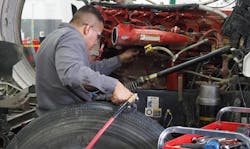This is Part 1 of a 5-part series on the trucking tech shortage and the strategies to combat it.
In case you haven’t heard, there’s a serious problem in the trucking industry: a shortage of maintenance technicians, an issue that jeopardizes fleet availability and perhaps, our very economy.
Okay, so you probably have heard this before. A lot. There’s a popular sentiment that when all the expert mechanics retire and these kids nowadays with their smartphones and participation awards take over, we’re all doomed. It’s the same stale narrative that’s been bandied about for the better part of the 21st century, not just in trucking but in all skilled trades. It’s also one in desperate need of a fresh approach and concerted effort to understand the root causes, so the truck technician shortage can finally get resolved.
Albert Einstein’s definition of insanity was doing the same thing over and over again but expecting different results. That seems to be the case here.
A search of fleetowner.com archives reveals this impending crisis dates as far back as February 2001, as an article noted Chevron addressing the “tech shortage already affecting many fleets” by starting a “diesel technician of the month program” to “enhance the professional image of this key occupation in trucking.”
Another from 2004 quoted Chuck Roberts, former executive director of the National Institute for Automotive Service Excellence (ASE), saying: “Truck mechanics represent an aging workforce and we’re not attracting anywhere near the same number of new hires to replace the ones that will retire” and that maintaining and repairing trucks is perceived as “tough, greasy, dirty work,” even though it’s way more computer-based and sophisticated than it was “10 or 15 years ago.”
In 2015, the Bureau of Labor Statistics calculated that by 2022, trucking will need to fill 67,000 technician jobs busted open by the “silver tsunami,” or the gradual retirement of baby boomers, as well as pick up another 75,000 diesel techs to address market growth. Because of the flourishing economy, there were a record number of commercial trucks and buses sold from 2018 to 2019 in the U.S. and Canada, which Navistar estimated at around 864,000 units. That’s a 28% increase from 2015-2016. And they are a lot more sophisticated than they used to be and will need able techs to ensure they stay roadworthy.
So for 20 years, people have been talking about the problem, but without enough action. It’s adorned the homepage of every trucking trade website, filled every think tank industry report, and orbited every consultant blogosphere. Everyone knew this was coming, so why hasn’t the issue been fixed?
Maybe because we have misidentified the culprit.
“We don’t have a technician shortage; we have a shortage of qualified applicants,” contended George Arrants, vice president of the ASE Education Foundation, to Fleet Owner.
He indicted both the schools and industry, saying they don’t properly communicate their needs to each other, leading to a major disconnect. He also pointed to disappointing retention numbers: an ASE survey found 42% leave the trucking field in the first two years.
“We’ve got a pipeline. There are just too many leaks in the pipe,” he said. “We have to fix the leaks.”
Arrants said this at the start of the new decade, within days of starting his role at the nonprofit, which evaluates and accredits the U.S.-based training programs, along with testing and certifying the potential truck and automotive technicians. He gave up his consulting business, which specializes in helping high school and college programs get accredited, to take a more active role in solving the problem.
His first action is to poke holes in the notion that the problem is merely unclear branding or lack of warm bodies. Like modern trucks, it’s way more complex.
The shortage cause
If there is a leak, it’s best to trace the pipeline back to the source. That would be the education system.
“The problem is sometimes what education is teaching isn’t what industry needs,” Arrants explained. He gave the example of a school spending $70,000 on a new engine training aid.
“For the same amount of money, they could have bought two whole trucks and had access to all the systems of the truck,” he said.
This would allow the students to get hands-on experience with more common equipment serviced by entry-level techs, such as brakes, electrical systems, and trailer components. Once they complete their coursework and start a job, those are the areas they will work on. After sharpening those everyday skills and learning those systems, Arrants argues, then the fleet or shop can teach them how to handle heavy engine work.
“There’s not a fleet in this country that’s going to put a 19-year-old on a $60,000 engine; it ain’t happening in my lifetime,” he said.
Another problem is the “museum-quality equipment” many schools are using, said Kenneth Calhoun, American Trucking Associations' Technology & Maintenance Council general chairman and treasurer. The 30-year-industry veteran said he has far too often witnessed instructors “teaching people how to overhaul engines that don’t exist anymore, and systems that have evolved significantly along the way.”
Calhoun, whose primary job is fleet optimization manager for Altec Service Group, pointed to significant EPA standard changes from 1998 to 2013 to curb emissions that drove this complexity. For the last decade, trucks have also added more sophisticated electrical systems, cameras, and sensors for collision avoidance and system monitoring.
This is where Arrants said students are most lacking.
“The biggest thing that’s killing us right now in the schools is electrical,” he stressed. “Instructors aren’t good at it. So, clearly, the students aren’t good at it. And then they get out in industry and nobody’s good at it.”
Recent data from SuperTech, TMC’s national skills competition for technicians, reflects the underwhelming knowledge level, with Arrants calling the general performance “borderline horrible.”
He said professionals still often score in the low 30s at the 16-year-old competition, and in the last two years, 30 contestants scored a zero.
Calhoun relayed budgetary concerns as a reason for the antiquated systems. Arrants, meanwhile, said techs use pricey multimeters with limited sampling rates when a lab scope costs a third less and much better to meet the diagnostic demands of modern electrical systems.
Along with training on old or unnecessary equipment, students aren’t learning what modern shops need in a new hire.
OEMs have engineered these complex systems to last more than 1 million miles, so the emphasis needs to be on preventative maintenance, both Arrants and Calhoun said. WyoTech, from where Arrants’ son recently graduated, does offer such coursework, while others he has visited don’t stress PM enough and are also unfamiliar with CSA (Compliance, Safety, Accountability) scores. Instructors “have never heard the term ‘out of service’ and the criteria associated with bringing the vehicle back into service.”
While the issue arises in the school systems, Arrants said it’s because fleets, dealerships, and shops in those communities are not acting as proper stewards.
Any accredited school is required to have an industry advisory council to guide them on the current needs of the fleet. If industry representatives use the meeting time as only an excuse for a good meal, a little talk, and no follow-through, as Calhoun alleged is often the case, the students never stand a chance.
Neither will shops and fleets expecting a competent influx of skilled labor.
“I’m not necessarily blaming education as I am industry, because industry comes to all these meetings, and they’re looking for the silver bullet solution that doesn’t exist,” Arrants said, referring to conclaves such as the upcoming TMC meeting at the end of February. “We have a national concern with a local solution.”
He urged trucking to “get involved.”
Calhoun concurred.
“It is a systemic problem that we’ve basically created for ourselves, and right now it has just about every industry you can think of in difficult shape,” he said. “We basically have allowed our secondary educational system to atrophy and idle.”
Every skilled trade, from welders to electricians to machinists, is facing some hiring crisis. Deloitte predicted that by 2028, manufacturing will have a deficit of 2.4 million workers and risk up to $2.5 trillion in lost productivity.
This puts the onus on trucking to ensure its prospective students and new technicians understand what the job entails at the onset, which isn’t always attractive, and where it can lead.
“We sometimes get the mentality of being in panic mode where we got these positions in these jobs we need to fill, when maybe we should be talking about the careers,” Calhoun said.
He explained that there are technicians who don’t look like they just emerged from an oil spill, who instead work on the high-tech electronics and use deductive reasoning to assess fault codes—the challenging jobs that would attract the best and brightest, but admitted, “We’ve been searching for a while on how to say that.”
The industry has known about the problem for decades, and now, as the last baby boomers inch closer toward retirement, luring the next generation into the trucking industry has never been more dire, the competition never fiercer.
“They’re going to go find work somewhere else,” Arrants warned. “And we’re losing a lot of them to other industries, advanced manufacturing, wind generation and other businesses.”
The question is who will plug the leak?
“We’re waiting for someone to come up with something that’s going to revolutionize everything and make the changes that we need to address all of our issues,” Calhoun said. “That’s not going to happen. What has to happen is for the individuals that genuinely care about it to understand that they have the ability to have an impact and make a difference.”
About the Author
John Hitch
Editor
John Hitch is the editor-in-chief of Fleet Maintenance, providing maintenance management and technicians with the the latest information on the tools and strategies to keep their fleets' commercial vehicles moving. He is based out of Cleveland, Ohio, and was previously senior editor for FleetOwner. He previously wrote about manufacturing and advanced technology for IndustryWeek and New Equipment Digest.

